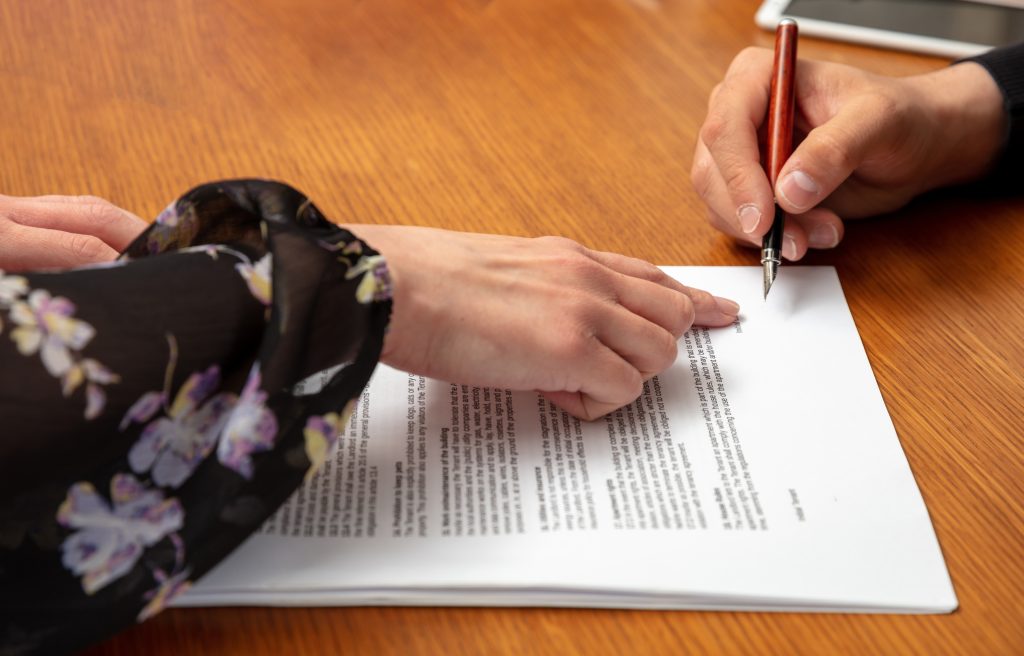How to Perform a Power of Attorney Notary Act

Are you looking to learn how to perform a Power of Attorney Notarial Act? If so, then you’ve come to the right place. In this blog post, we’ll walk you through everything you need to know to carry out this act successfully. We’ll also provide some helpful tips, so read on!
What is a Power of Attorney

A Power of Attorney is a legal document that provides authorization to another individual, known as an Attorney-in-Fact, to make decisions and sign documents on your behalf. They act as your attorney agent. This is also known as representative capacity.
If the Attorney-in-Fact’s signature appears on a document signed, then it’s equal to your signature on the document.
It grants the Attorney-in-Fact you designate the ability to enter into financial contracts, sign legal documents, manage bank accounts, and act in other important ways representative of you and your financial interests.
What is an Attorney-in-Fact?

An Attorney-in-Fact is a person you designate in the Power of Attorney document who will act on your behalf. This will be the only person who can act on your behalf and will sign his or her own name on your behalf.
According to the Power of Attorney document, they are legally obligated to honor your wishes and act in good faith.
Note that even though the word “attorney” is used, someone’s attorney-in-fact doesn’t need to be an actual attorney.
Can an Attorney-in-Fact have a financial interest when signing legal documents?

No. When acting as an attorney-in-fact, the individual must put their interests aside and act only in their best interest.
This means they cannot have any direct financial interest in the documents they are signing for you.
An attorney should draw up the Power of Attorney document, and the notary’s job is only to witness the signature(s) on the document, not to give any legal advice or draw up the document.
However, this sometimes gets difficult signing documents because many Attorneys-in-Fact are related to the person granting the Power of Attorney, especially if they are going into the agreement because they are old, sick, or mentally deteriorated.
For example, a person in the hospital who cannot manage their finances might grant a Power of Attorney to a spouse or child. That spouse or child must always act in the principal’s behalf even though they obviously might have an interest in a particular transaction.
Obviously, this can cause legal questions against the person named as the Attorney-in-Fact by other family members if they disagree with the certain way that any decision was made.
That’s why it’s usually recommended that the Power-of-Attorney document is specific enough not to let others question the decisions made and that a will exists that clearly explains the principal’s intentions.
But since the law prevents notaries from giving legal advice unless the notary is a lawyer, this would require notaries to keep their mouths shut if they see Powers of Attorney documents that can likely cause confusion in the future.
In an ideal world, both sides (the principal and the Attorney-in-Fact) should have the document read by their attorneys before signing.
For example, a family member in another state recently asked me to have power of attorney over her finances during a medical concern that might result in her death.
I told her that after her attorney drew up the document, I’d run it by my attorney to fully understand my responsibilities before signing to act on her behalf.
Why would you need a Power of Attorney?

This legal document can benefit individuals who cannot perform specific tasks due to medical issues, extended business trips, or other circumstances that might prevent them from managing their affairs and making important decisions.
Executing such power also shows due care and protection of your property while you are away and allows you peace of mind knowing your assets are being managed according to your wishes.
Moreover, it’s also essential for elderly individuals or those with medical issues who may not have the capacity to make sound decisions on their own and need someone else to manage their financial affairs.
When deciding whether or not to grant Power of Attorney, you should consider all the risks and rewards associated with such an action.
The best way to make sure everything is done correctly and legally is to talk to an experienced attorney who can help you understand the legal implications of granting someone else Power of Attorney.
It’s also important that you choose someone trustworthy, such as a family member or close friend, to act as your Attorney-in-Fact.
The requirements for performing a Power of Attorney

To perform a Power of Attorney, several steps must be taken.
The first step is for the Principal and Agent to sign the document in the presence of a witness and a Notary Public (this can vary based on state laws).
The next step is for the notary public to fill out their part of the form, confirming details about the witnessed and signed documents.
Lastly, if any additional items need to be completed by state law before completion, all required forms must be filled out and submitted.
A successful notarization means that all necessary elements have been appropriately addressed and accurately by both parties, with enough documentation for authentication purposes.
How to protect yourself when granting power of attorney
Protecting yourself and your assets is vital when granting someone Power of Attorney.
Make sure the document you create is specific enough that there won’t be any confusion as to what powers are being granted, and make sure to name a trusted individual to act in your best interests.
You should also include a section that requires the Attorney-in-Fact to provide an accounting of all actions taken on your behalf and any funds spent.
Additionally, you should keep copies of all documents for yourself and ask for regular updates from the person handling your affairs.
Finally, you should have a plan to revoke the power of attorney if the need arises.
Talking to an experienced attorney specializing in Power of Attorney documents can help ensure that you adequately protect yourself and your assets when granting someone else power over your affairs.
How to go about performing a Power of Attorney

Preparing to perform a Power of Attorney involves careful attention to all applicable laws and regulations. It’s essential to understand the document granting the powers of attorney, research relevant statutes, and obtain all necessary documents.
There are specific steps you need to take as part of the process to ensure that a power of attorney is legally valid, including verifying the identity of the principal granting powers and administering an oath or affirmation; each state has its procedures for performing notary acts related to the power of attorney assignments.
For these reasons, it’s essential to understand what’s required to complete this activity successfully. With knowledge about the procedures and diligence in following them, a reliable notary can ensure that a Power of Attorney is performed correctly and considered legal.
What to do after the Power of Attorney is complete

Once a Power of Attorney document has been completed, it is essential to be stored safely and securely.
All parties involved should be provided copies of the form as proof that they have agreed to comply with the act.
Additionally, it is recommended to keep detailed records, such as notes and receipts, to ensure everything was completed correctly.
Finally, if any individual named in the document ever needs to revoke or suspend the power of attorney imposed by the act, official paperwork would be necessary.
Keeping all documents related to your Power of Attorney is an essential step for maintaining legal records and safeguarding this document’s validity and value.
Are there special rules when notarizing a document granting power of attorney to someone?

Some jurisdictions might have specific rules about notarizing the documents that give authority to the attorney.
Always follow state laws when requesting notarization for signature on an attorney’s document.
If the notary is notarizing a signature on the Power of Attorney document, the notary should get the signer’s thumbprints on the documents if required by state law. California is one state that requires this. Other states typically do not require thumbprints.
Normal state notary laws also apply (e.g., the signer is physically present before the notary, etc.)
How do I know if a Power of Attorney is valid?
For a Power of Attorney to be considered valid, it must adhere to the rules and regulations set forth by the state in which it is being executed.
Each state may have different requirements, so make sure you understand exactly what is required before beginning the process.
How do I notarize the signature of someone who has power of attorney?

When notarizing the signature of someone with power of attorney, the process is very similar to any other document. The notary must ensure that the signer is present before them and can identify themselves.
The notary must also confirm that the person signing is authorized by law to execute documents on behalf of another person. Once these requirements are met, the notary can witness and certify the signature.
The signer must affirm that they are signing of their own free will and that any information on the document is accurate.
If required by state law, thumbprints may be necessary on the documents before it can be legally executed. Once these steps are completed, the document can be notarized and considered legally valid.
What do Loan Signing Agents have to know about Powers of Attorneys in loan documents?

Loan signing agents must understand the basics of power of attorney documents to ensure that a loan is properly notarized. They should be aware of the legal requirements for power of attorney and how to authenticate and identify any document granting such authority.
Finally, loan signing agents should be familiar with the state laws regarding power of attorney documents and when they are required. This will help them ensure that all proper procedures are followed for each loan transaction.
In most cases, however, title companies or any other closing company will give specific instructions to the Notary Signing Agent regarding how the borrower should sign any notarial certificates as the Attorney-in-Fact. Notary Signing agents should not determine the proper way or the specific format for the Power of Attorney signature, whether it’s on a quitclaim deed, affidavit, or other documents. That’s up to the title company to determine.

A Power of Attorney document is a powerful legal tool that can help individuals manage their affairs, protect their assets, and provide peace of mind while away.
However, it’s essential to understand the process involved in creating and executing this document and the procedures for maintaining its validity.
With this information, you can ensure that your Power of Attorney is used correctly and protects both parties involved.
In summary, the Power of Attorney document must be carefully reviewed to understand the terms and conditions set by the parties granting authority.
The notary must follow all applicable laws before witnessing or certifying the signature for authentication purposes.
A reliable notary can ensure a Power of Attorney is legally valid with proper attention to detail and diligence in following procedures.
If you are ever in doubt about properly notarizing a document granting power of attorney, be sure to seek the advice of a qualified legal professional for assistance.
With their help, you can rest assured that your documents will be accurately signed and securely stored for future reference.





